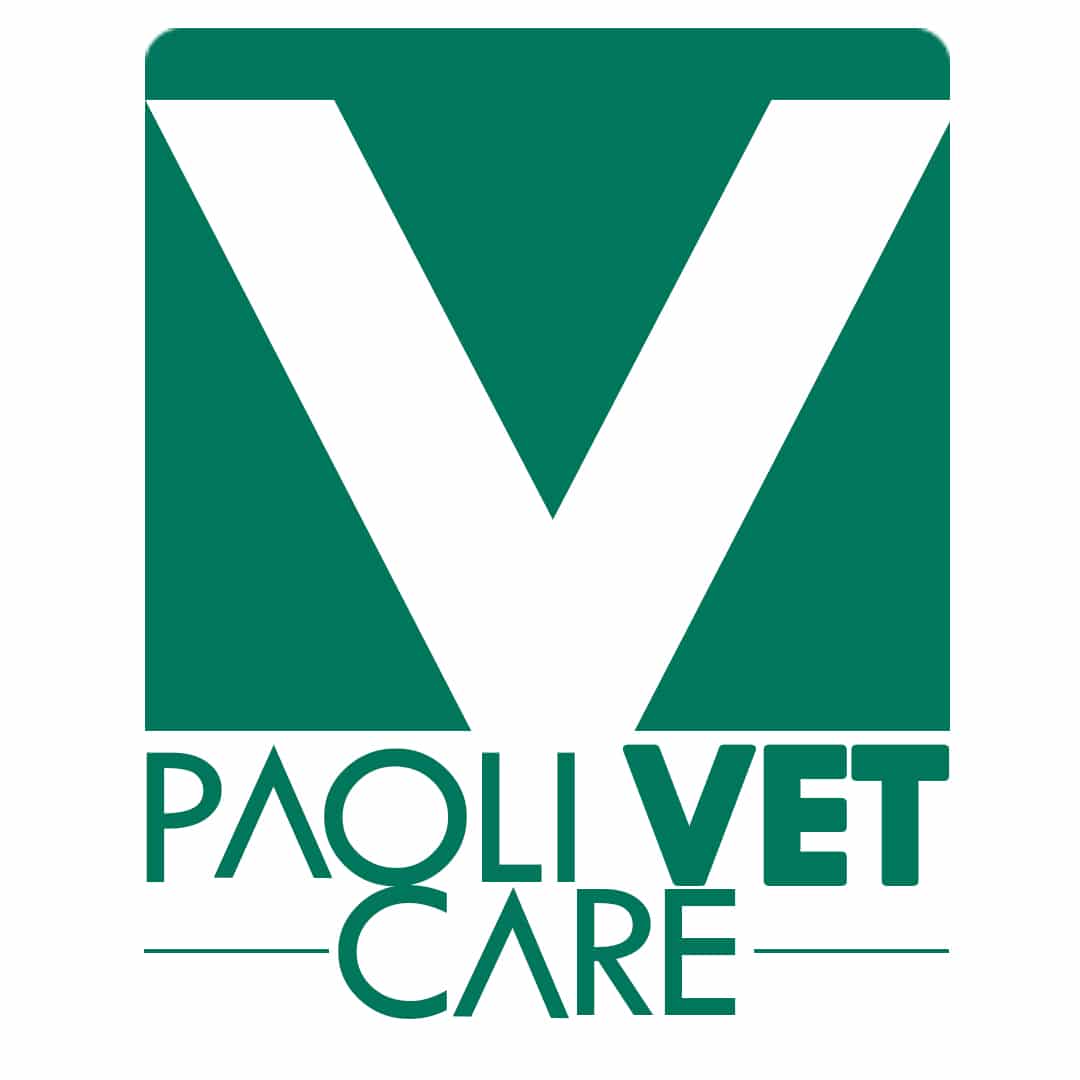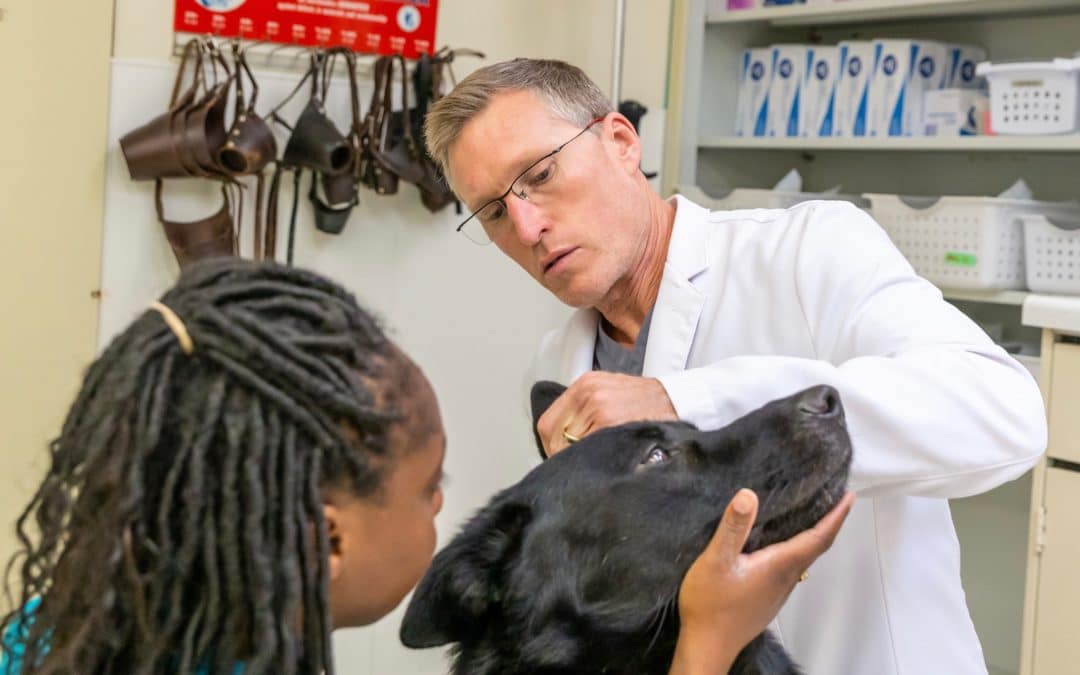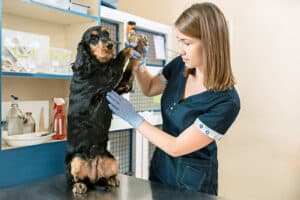Planning for Veterinary Care:
Table of Contents
Whether you’re a dog person or a cat person, owning a pet is an extraordinary journey. It’s also a tremendous commitment. As a pet owner, you’re responsible for their health and well-being, which goes beyond diet, exercise, and belly rubs. You also have to make sure they get their routine veterinary check-ups to keep them happy and healthy.
Vet care costs can become overwhelming if you don’t know what to expect. In this article, we’re going to break down the cost of essential vet visits. We’ll also discuss the other factors that may impact the cost of your pet’s overall health care.
How Much is a Vet Visit Near Me?
Expect to take your adult cat or dog for a routine vet check-up once to twice a year—definitely two times per year if they’re over seven years of age. The cost of a typical wellness visit can range anywhere from $50 to $400. Depending on the region you live in and any necessary treatments, tests, or other needs such as microchipping, costs will vary significantly. Paoli Vetcare and some other veterinarians offer
Onboarding for new clients. Take advantage of this first visit to set up your next appointment, ask any questions you might have, and get your pet on track toward better health.
How Much is a Vet Visit For a Kitten or Cat?
The cost of a vet visit for your cat will depend on a few factors. For example, their age, their condition, and whether they need special procedures, medications, or vaccinations. Here’s an average price list for your kitty’s routine check-up:
- Wellness exam: $45 – $75
- Vaccinations: $15 – $35 each (estimate $60 for all core vaccines)
- Fecal exam: $25 – $45
- Dental cleaning with anesthesia: $300+
- Geriatric screening blood work: $100 – $300
- Spaying/neutering: $90 – $300
Keep in mind that your cat will not require all of these tests, exams, vaccinations, and procedures in one visit.
For example, geriatric screening isn’t necessary until your cat is at least seven years of age. Core vaccinations such as Panleukopenia, Herpesvirus, Calicivirus, and Rabies are all required during kittenhood, along with spaying or neutering.
Additional testing (Feline Leukemia, FIV) may also be necessary if the kitten is a stray. Specific vaccinations must be boostered every one to three years, depending on how long that particular vaccine is designed to last.
How Much is a Vet Visit For a Puppy or Dog?
How much is a vet visit for a dog? The cost of a visit for your pup depends on mostly the same factors as a cat—age, condition, special procedures, etc.:
- Wellness exam: $45 – $75
- Vaccinations: $20 – $40 each (estimate $80 for all core vaccines)
- Fecal exam: $25 – $45
- Dental cleaning with anesthesia: $350+
- Allergy testing: $195 – $400
- Heartworm testing: $45 – $55
- Heartworm treatment: $750 – $4,000 (high end with heart failure and requires specialty care)
- Geriatric screening: $100 – $300
- Spaying/neutering: $200 – $450
Initially, vet visits for a puppy are going to be more expensive than for a kitten because pups require more rounds of shots to keep them safe from common pathogens like parvovirus.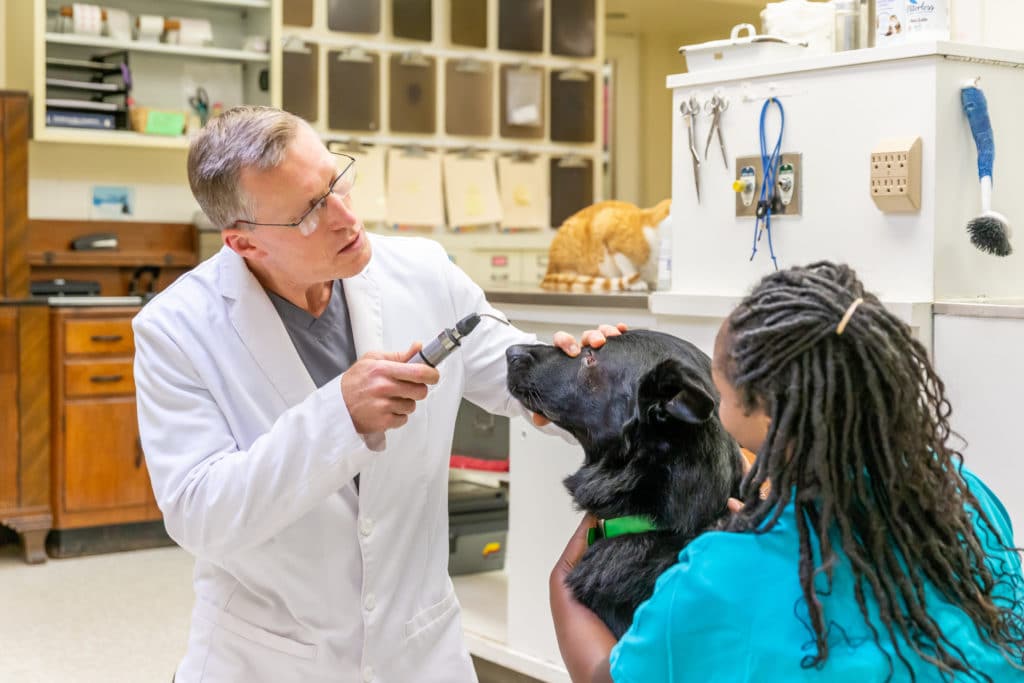
What Impacts the Price of a Vet Visit?
Routine vet visits are the foundation for maintaining your cat or dog’s overall health and give them the best opportunity to enjoy a long and happy life. The typical wellness check-up involves a thorough physical exam, a vitals check, and specific questions about your pet’s behavior and habits.
They also may include a fecal examination, blood tests, vaccine boosters, and cleanings. The information gathered by your vet during this routine visit is often the key to diagnosing health problems that have been flying below the radar. Since pets age so much faster than we do and they are not able to directly communicate, the quality of a veterinarian’s skill and their experience is crucial to detecting the disease early which improves health outcomes for pets.
Here’s how they factor in:
Tests & Screening
A veterinarian may recommend blood tests as health screenings for the purpose of early disease detection and preventative care. As you know, our furry family members age faster than we do. Therefore, age-related changes in health also come about faster. We also tend to forget that it’s instinctual for animals to hide any pain or discomfort so that any weakness is not exposed to potential predators. Making an evaluation of routine blood work an invaluable tool in a vet’s disease-fighting arsenal.
Test results can be used as benchmarks to measure your pet’s health at the time of their yearly wellness check-up. The three primary tests include:
- Complete blood count (CBC): A blood test used to evaluate overall health and detect a wide range of disorders. Abnormal increases or decreases in cell counts as revealed in a CBC indicate an underlying medical condition that calls for further evaluation. It measures several components and features of the blood, including:
- Red blood cells, which carry oxygen
- White blood cells, which fight infection
- Hemoglobin, the oxygen-carrying protein in red blood cells
- Hematocrit, the proportion of red blood cells to the fluid component, or plasma, in your blood
- Platelets, which help with blood clotting
- Chemistry profile: Provides important information about the current status of your pet’s metabolism—blood sugar (glucose) levels, the balance of electrolytes and fluid as well as the health of the kidneys and liver. Abnormal results, and especially combinations of abnormal results, indicate a problem that needs to be addressed.
- Urinalysis (UA): The UA is used to detect and manage a wide range of disorders, such as urinary tract infections, kidney disease, and diabetes. A UA involves checking the appearance, concentration, and content of urine. Abnormal urinalysis results may point to a disease or illness. For example, a urinary tract infection can make urine look cloudy instead of clear. Increased levels of protein in urine can be a sign of kidney disease. Unusual or abnormal UA results sometimes require more testing to uncover the source of the problem.
Of course, these are additional tests used for screening which are suggested based on your pet’s condition as well as their age. The typical tests a young cat or dog will receive during their yearly wellness check-up include a physical, a fecal exam, a heartworm test, and vaccine boosters. Screening CBC, Chemistry, and UA are not routinely recommended until middle age which varies with breed. Large dogs are much faster than small dogs.
However, if you notice that your three-year-old pup is acting differently, such as not eating or being unable to control their bowel movements, these additional tests may become necessary, based on your pet’s history and physical exam results. If you have any concerns, it’s better to be safe than sorry. If it’s after hours, you can often book an appointment with your veterinarian online or call to be seen first thing in the morning.
Vaccinations
Dog and cat vaccinations are categorized by core and non-core. Core vaccinations are given to puppies and kittens to safeguard them against common and dangerous diseases and infections. Non-core vaccinations are given based on the risk factors of the individual animal.
As previously mentioned, there is a specific vaccine schedule for puppies and kittens, which include core vaccines and boosters. As they enter adulthood, depending on the design of the vaccine, your dog or cat may need a single dose booster every one to three years.
General vaccination guidelines call for between two and four vaccines per year. Sometimes, pet owners request titer tests before vaccinating. Titer tests measure a pet’s immunity levels to help decide whether each specific booster vaccination is needed. Titer tests are not routinely recommended by veterinarians (or human doctors) because most medical professionals don’t believe the benefit of titers outweighs the additional cost in time and money.
Since rabies is a fatal disease in humans and a public health concern, rabies vaccination is mandatory across all US States.
For details on individual pet vaccines, you can read the University of California Davis’ veterinary hospital vaccination guidelines. They are based on published studies and recommendations made by task forces (including the AAFP/AFM Advisory Panel on Feline Vaccines, AAHA Canine Vaccine Task Force, and World Small Animal Veterinary Association), which include representatives from academia, private practices, governmental regulatory bodies, and industry. These groups have evaluated the benefits versus risks of the vaccines currently available on the market.
Pre-Existing Conditions?
The majority of your pet’s vet visits are considered preventative care. As they age, however, pets often develop a variety of health issues related to the aging process. Of course, animals of any age are capable of contracting infectious diseases, and there is also the possibility of accidents that require immediate and urgent care.
Depending on the situation, occasionally you may need to have your pet diagnosed and/or treated by a veterinary specialist. Because the veterinarians at Paoli Vetcare are experienced in a wide array of medical conditions and surgical procedures, they are able to diagnose and treat the vast majority of pets without referring you to a costly veterinary specialist.
Pet Maintenance & Dentistry
Maintenance procedures can be done at the same time as your pet’s yearly check-up, but usually for additional fees. Typical fees for nail clipping, ear cleaning, and anal gland expression usually run between $15-$30 per service.
Dental cleaning under general anesthesia may cost $400 or more for tooth extractions with advanced periodontal disease. To learn more, read Why Are Dentals So Expensive? After the age of 4 or so, it is recommended that you have your dog or cat’s teeth cleaned, at the most, once yearly. Your veterinarian will make a recommendation tailored to your pet at the time of their annual physical exam.
Just like in humans, pet dental cleaning is essential to their overall health as plaque build-up can lead to inflammation and infection of the gums, which can travel through their bloodstream to vital organs.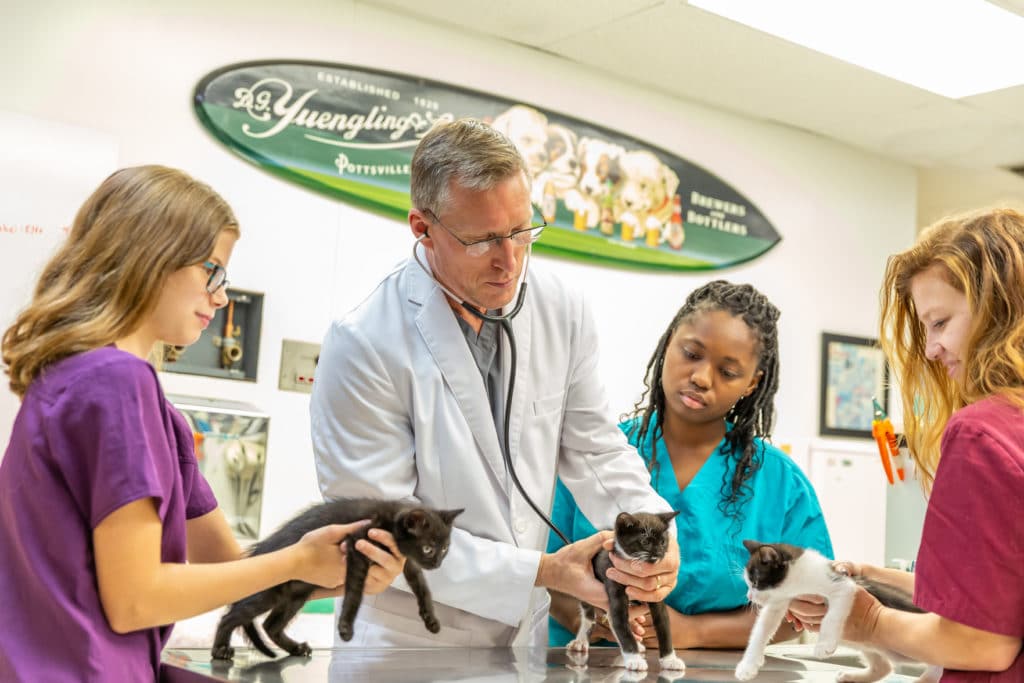
What Is The Average Animal Check Up Cost?
The national average for veterinary visits is between $50 and $100—though it depends on the details. Routine visits may not be necessarily routine. Even if your local vet charges a certain amount for a standard exam, another vet may charge more or less for the same exam. Estimating the costs for a checkup is tough to average, but you can also reach out to your trusted local vet and ask them to be transparent with their costs.
AAHA Accreditation
AAHA accreditation is another factor that can impact the cost of your pet’s vet visit. The best veterinary hospitals uphold AAHA Standards of Excellence. Today, only 12 to 15 percent of veterinary practices across the United States and Canada hold an AAHA accreditation.
Paoli Vetcare has been continuously AAHA-accredited since 1960! That means our team and facility lead the way in providing top-level care for pets and their families. Choosing Paoli Vetcare ensures your pet receives the highest quality care at a manageable rate.
Consider Joining the Paoli Vetcare Family
We invite you to meet Dr. Jay Rowan — the best-reviewed veterinarian on the Main Line. You can book an appointment online now. If you’d like to support our animal hospital, please shop for your pet food and medications through the Paoli Vetcare Online Pharmacy.
